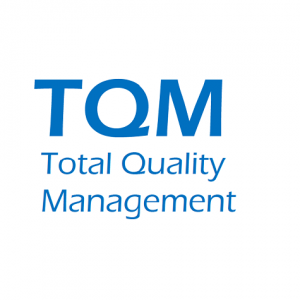
Besides William E. Deming, Joseph Juran is also one of the founders of TQM. Its origins lie in the industrial sector of Japan (1954). Since then, the concept has been further developed and can be applied to almost any type of organization such as schools, highway maintenance, hotel management and churches. Today, TQM is also used within e-business in the form of quality management from the customer's point of view.
The central goal of the Total Quality Management training is the concept of 'doing it right the first time' and that every time. This saves the organization the necessary time on corrections and failed product and service implementations (such as warranty repairs). TQM can be set up separately for a specific organization as well as a set of standards to be followed, for example the International Organization for Standardization (ISO) of the ISO 9000 series. TQM uses the strategy, data and communication channels to integrate the desired quality principles into the culture and activities of the organization.
It is of eminent importance to have the idea with the use of TQM that customers determine the level of quality. Regardless of what efforts are made in the field of training employees or improving processes, the customer ultimately determines, for example through evaluation, whether the measurement of satisfaction or the efforts made have contributed to the continuous improvement of the quality of the products and services.
Employees are the internal customers of an organization. Their involvement in the development of an organization's products or services largely determines the quality. Create an engaged culture in which employees feel involved with the organization and its products and services.
Process thinking and process action are part of the foundation of TQM. Processes are leading and systems and people support these processes on the basis of goals that are linked to the mission, vision and strategy.
In line with principle 3, an integrated organizational system that can be modelled, for example ISO 9000 or its own quality system, is important in order to gain insight into and control over the quality of an organization's products or services.
A strategic plan should embrace the integration and development of quality and the development of an organization's products or services.
The decision-making within the organization is only based on facts and not on the basis of opinions (emotion and personal interest). Data should further substantiate this.
A communication strategy must be formulated that is in line with the mission, vision and objectives of the organization. This strategy includes the stakeholders, the level within the organization, the communication channels, measurability of effectiveness, timeliness, etc.
Using the right measuring tools and innovative and creative thinking, continuous improvement proposals are initiated and implemented in order to develop the organization to a higher quality level. A supporting method is the Deming cycle (Plan-Do-Check-Act).
Implementing TQM is the implementation of a concept. It is not a system that is just implemented, but a philosophy that must be integrated into the organization and its culture. Practice has shown that there are a number of basic principles that contribute to the successful roll-out of TQM within an organization.
• Train top management on TQM principles and ask for their commitment to the rollout.
• Evaluate the current culture, customer satisfaction and the quality system.
• Top management determines the desired core values and principles and communicates these within the organisation.
• Develop a basic TQM plan based on the aforementioned basic principles.
• Identify and prioritize customer and market needs and plot them on the organization's current services and products.
• Determine the critical processes that make a substantial contribution to the products and services.
• Organize teams that get started with process improvement, for example quality circles.
• Managers support these teams through planning, resources, time and training.
• The management integrates the desired changes for improvements to the daily processes. Standardization takes place after the implementation of improved processes.
• Continuously evaluate the progress in this area and adjust the planning or other matters if necessary to make adjustments.
• Stimulate the involvement of the employees in this. This mainly concerns awareness and the necessary feedback that leads to improvement of the whole. Support this with, for example, a reward model (Management by Objectives) and recognition.
For more related training you can visit the overview page Soft skills look.
The Total Quality Management course is for anyone interested in TQM.
No prior knowledge is required for the TQM course.
The level of the TQM course is MBO+.
The Total Quality Management course takes 1 day in total.
A TQM exam is available on request, for more information please visit op X (voorheen Twitter) over de veranderende dynamiek tussen industriële metalen en goud. Hij benadrukte met name dat de verzwakking van de basismetalen vorig jaar contrasteerde met de versterking van goud. Dit verschil zou nog groter kunnen worden als “het beleid van de Federal Reserve als een betrouwbare indicator zou dienen”, opperde de Commodity Strategist. look.
If you register your company for an in-company Total Quality Management training via D-ICT Solutions, you can always have one of our trainers/consultants visit you (or virtually) for an implementation session Total Quality Management training. During this afternoon or morning you will receive advice regarding the optimization or organization of Total Quality Management training within your organization by a certified expert.
